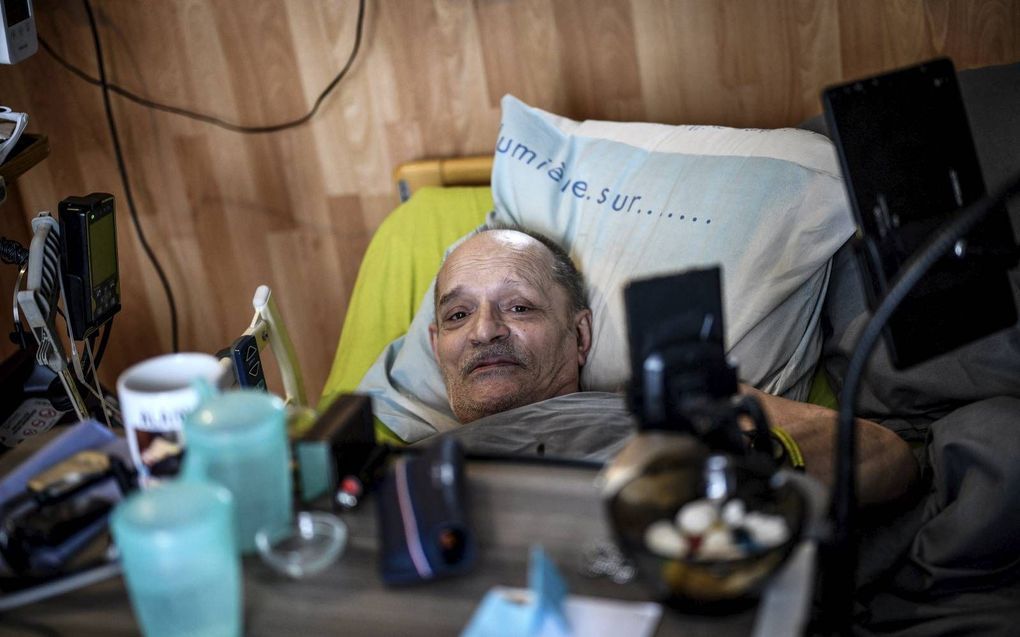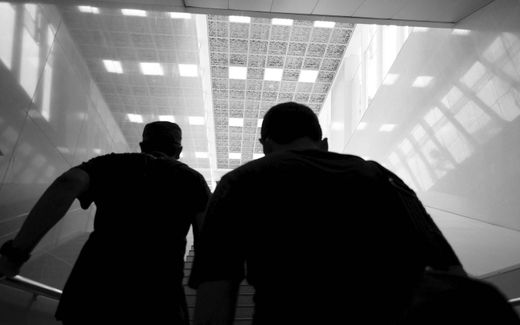My story as an irrefutable argument
18-07-2022
Opinion
Geerten Moerkerken, RD

The images of Alain Cocq on his bed went viral in 2020. Photo AFP, Jeff Pachoud
Opinion
When Alain Cocq tried to broadcast his deathbed live over the internet in 2020, he wanted to cause an "electroshock" in the French euthanasia debate. What happens to discussions on complex ethical issues when I-stories become central to them?
For years, Alain Cocq has been suffering from a debilitating illness that slowly but surely affects his vital organs. The complications pile up: five heart attacks, seven strokes. Attempts to revive him succeed but leave the Frenchman weaker than before.
Cocq sees a way out of his suffering: a self-chosen end to life. But active euthanasia is forbidden in France. A letter to Emmanuel Macron does not offer what he is looking for either. "I am not above the law," the president wrote back in early September 2020, "and therefore cannot respond to your request."
The president is following Cocq's case "with emotion", he stresses. After the "no", the 57-year-old patient makes a drastic decision: he stops eating and drinking. He places a camera next to his bed. The world should witness his death via Facebook. This does not happen: the media platform takes the stream offline. But Cocq's point is made and attracts worldwide attention. As he hoped, his example should cause an "electroshock that makes it possible to permit assisted suicide", says his spokeswoman.
Cocq's decision does not lead to his death. Seriously weakened, he is admitted to the hospital. In June 2021, his life ends when an NGO finances his assisted suicide. It happened across the border, in Switzerland, where it is legal. Cocq describes it as "a redemption" but also calls it "a death in exile". French media posthumously portray him as a "champion of a dignified end to life."
Debate
The harrowing case reignites the already tense debate on euthanasia in France. This is not done for the first time based on a dramatic personal life story.
But it is not only the advocates of the self-chosen end of life who make themselves heard in this way. When, in April, the French parliament was preparing for a debate on euthanasia - with the Cocq case still fresh in its mind - the Soulager mais pas tuer (lighten up, but don't kill) foundation made its presence felt with an impassioned plea against the liberalising of the law.
The face behind the initiative is Philippe Pozzo di Borgo, a wealthy businessman. It is not that Pozzo di Borgo does not know what suffering is. In 1993, he became almost completely paralysed after a paragliding accident. In despair about his disability, he attempted suicide with an oxygen hose. Later, he would become an advocate for people who, as he says, "are on the margins of society." His life story also became world-famous overnight when it was filmed in the 2011 blockbuster "Intouchables".

Legalising euthanasia places tremendous pressure on the vulnerable, Pozzo di Borgo stresses. "Don't you see," he asks the press just before the parliamentary debate, "the increasing pressure - even coercion - in a society that destines some of its citizens to death? Coercion, on those individuals who are most often shunned, those who suffer extreme pain, those who are very isolated, those who are extremely deformed, those who evoke our pity, and who - as some claim - cost the most?"
The question is whether Pozzo di Borgo's speech would have left the same impression had the paralysed businessman not been speaking from experience. Thus, not only his words but, above all, his life, function as a counterbalance, a 'counter narrative', in the social debate. In contrast to the appeal that - on purpose - emanates from Cocq's end of life, there is no cold collection of dogmas but a human story of someone of flesh and blood who knows about pain and suffering.
Influence
The example of France shows how dominant personal stories can become in complex ethical discussions. This is not limited to France, nor the debate on euthanasia. Life stories are popping up in many areas that greatly influence the social debate.
When the Lower House in the Netherlands debates the mandatory time of reflection on abortion in early 2021, public broadcaster NOS airs a story on the subject. The headline: "Consideration period for abortion under fire: "The days I had to wait were hell". Twenty minutes later, the headline was changed to the more neutral "Time to think about abortion - burdensome or necessary? Topic up for discussion again". However, the approach of the article does not change. The article presents one personal perspective: the experiences of a woman who has experienced the reflection period as "hell", "emotionally very stressful" and "very intense".
Or take the migration debate. Politicians regularly sound harsh words about a stricter deportation policy until names pop up. Lili and Howick, for example. Under great political pressure, Dutch State Secretary Mark Harbers used his discretionary power in 2018 to allow the brother and sister to stay in the Netherlands after the asylum children ran away from their residence address.

But immediately after Harbers' decision, a new discussion erupts: Is this fair? What about all those other children? Isn't there an element of injustice and arbitrariness in highlighting this story? Shouldn't deportation or being allowed to stay be based on clear rules instead of on the amount of media attention a case gets?
However different the examples are, they all show the tension between a general discussion on ethics -the question of what is right to do- and people's individual, personal stories.
Personal stories regularly occupy an important or even decisive place in the social debate on tricky issues. Sometimes such experiences seem to be the only argument that really weighs in the discussion. The role of the media, which almost always chooses to illuminate ethical discussions through the lens of a life story, is striking. What actually happens to such a discussion when personal stories become so important? And, not unimportantly, how should Christians relate to such a storytelling culture when they want to speak out on ethical issues?
Motives
It is not so easy to prove that this role of personal stories has increased in recent decades. What is older than today is casuistry: the singling out of an individual case, a case study, to discuss general principles.
Like the Scribes and Pharisees dragging a woman caught in adultery by the hair out to Jesus. Their motives are not too noble, for they are "beseeching Him that they may have something to accuse Him of." They hold to Jesus the general principle, the norm: surely Moses commanded in the law that such people should be stoned to death? But does this rabbi also apply this principle now to this personal case - or does He then take a dim view of the law? "Thou, then, what sayest thou?"
The use of "narratives" in ethical debates is, therefore, "of all times", suspects Prof. Dr Theo Boer. According to the Dutch Protestant Theological University's ethicist, the role of media such as television and film has changed significantly since the last century. "They allow us to visualise much more. We put the camera close to people and wait for the tears to flow - the climax of the interview. Personal stories, especially the tears, are hard to beat.”
It is not strange, this leading role in experiences. After all, ethics is about people. Ethics without life stories is peddling air, philosophising without feet in the mud. You cannot debate boat refugees without realising that on board are also boys like 3-year-old Alan Kurdi - the images of his lifeless body on a Turkish beach shocked the world in 2015.
Principles
The question is whether Christian ethics have always taken this sufficiently into account, says Prof. Dr Arnold Huijgen, Professor of Systematic Theology at Theological University Apeldoorn. "In the last century, the neo-Calvinist tradition of ethics, as practised by, for example, Jochem Douma, thought entirely in terms of general principles. There are several Bible texts with a line underneath: this is the conclusion. There was no I-story involved. The danger is that you may be right, but people can still get between the wheels."
But the world is changing. The rise of postmodernism brought an end to grand narratives; increasingly, the "authentic story of the individual" took centre stage. It is, therefore, not surprising that in such a culture, experiences increasingly colour social discussions on ethics. The personal story may be of all times, but receptivity to it has increased considerably.
This development is reflected in the media - and not only the secular ones. In the offices of the Dutch daily Reformatorisch Dagblad, too, the "personal approach" has become a tried and tested recipe. The 'I' story, in which the journalist writes about himself - still taboo a few decades ago - has made its appearance. Major themes must be given a face with a human story. Preferably also a Christian face because that brings the story even closer. It is not uncommon for these articles to be the most read online.
Although the term postmodernism often has a negative ring, it would not be right to view such a shift in an exclusively negative light. For example, the development in Christian ethics gave an eye to the downsides of "only thinking in principles", says Prof. Huijgen. "Nowadays, we involve people and think it is logical. So, I don't see the role of personal stories as only negative. Still, the tendency is currently threatening to go too far."
Function
The latter - the role of personal stories going too far- happens especially when the function of stories in a discussion is unclear. It makes quite a difference how experiences are used, says Prof. Boer. The ethicist distinguishes two main ways in which this happens: as an illustration or as a strategy. "With a personal story, you can illustrate an ethical value; that is valuable."

But not infrequently, life stories are "used strategically", he observes. "Then they become an argument, meant to win people for your position. This happens a lot; for example, the Dutch Association for a Voluntary End to Life only lets people hear about experiences of successful termination of life, or about horrible deathbeds without euthanasia."
Anyone who closely looks at ethical themes that play a role in society will quickly see this strategic use of stories emerge. Sometimes subtly, for example, by choosing one perspective as the broadcaster. Sometimes a story is used as a crowbar.
It regularly happens to Professor Boer that he is confronted by someone who has experienced an abortion or euthanasia in their surroundings while discussing ethical problems such as these. "Usually I say: Humanly speaking, I can understand your point of view very well. And in your individual case, I might even agree with you. But as an ethicist, you must always keep the whole picture in mind. You cannot be guided by only one perspective."
And that is where it often goes wrong when using personal stories, he argues, when the discussion is narrowed down to just "the emotion argument." The professor cites the example of abortion following the abuse of a woman. "In such a case, abortion seems successful, from that one perspective: this woman's emergency. But ethics also has to deal with other perspectives, such as the interests of the unborn child."
Complexity
The defining characteristic of an ethical problem is that it has multiple sides. An illustrative personal story shows precisely that complexity. This does not mean that this tension can never be resolved, says Prof. Boer: "Sometimes, there is only one correct solution. But where this stratification is lacking in the ethical discussion, something is wrong."
That stories become arguments has everything to do with the central place that authenticity has in our culture, says Prof. Huijgen. "That is something very individual: authentic is what you consider authentic. But with that, a story, certainly a unique experience of a victim, can become a huge claim to power. No one else can touch that."
According to the professor, a "mix" is needed in ethics. The personal story is not missing, but neither is it the only one. "That means that you don't reject a person who tells his or her story, but at the same time, you can say: the choice that is made or the claim that lies behind this story, I don't share that."
Suffering
At the same time, the way narratives function in ethical discussions exposes a great discomfort in our dealings with suffering. Many experiences that function as arguments can be traced back to a form of suffering. The underlying idea is simple: this suffering must be removed, and the inescapable solution lies in a choice. As the Frenchman Cocq streamed off his deathbed with one message: with a self-chosen end to life, this suffering would not have been necessary.
An answer to this is not so simple, says Prof. Boer. He points to an "ambiguous" relation of Christianity with suffering. On the one hand, there has always been the line of learning to live with the fact that existence involves suffering. "I think that is a quality of the Christian faith. One of the most important virtues in the Early Church was patientia: patience. That is what made the early Christian church great."
But that's not all. Christianity does not glorify suffering. On the contrary: Jesus took away suffering; he healed sickness and disease and took them upon Himself. "Salvation in the Biblical sense is also freedom from suffering."
According to the professor, Christianity gives a "mandate and task" to prevent suffering, "but not at any price." He points to Romans 8: that all things will work together for good for those who love God. This means that a Christian who suffers "always knows how to deal with it. We need not panic when suffering arises that we cannot remove. The notion that something good can come out of suffering has largely been lost in our time. That seems to me to be an impoverishment.
Correction
It is a delicate balance. Where ethics 'dehumanise', seeing only principles without the harrowing and diverse stories behind them, people are oppressed. But where ethics are 'overhumanised, only looking at the individual story without other perspectives, important values get out of sight. At the same time, it is not easy how this second correction should sound in a culture full of 'I'.
This presents Christians with the question of how to discuss ethics in a culture of authenticity. Talking about principles is not trendy and feels like an admission of weakness in the face of authentic experiences that dominate discussions. Coming up with a general value as an answer to human problems no longer works. What's more, it evokes resistance.

Does this mean that Christians are called to give answers in the language field of today, that of personal stories? Can a response to the irrefutable argument of experience be a counterculture of stories? Showing that things can be different, not via the route of principles, but via the route of authentic experiences? Like the paralysed Philippe Pozzo di Borgo's plea against euthanasia: it is powerful because it carries the weight of his knowledge of suffering. Or as the Week of Life often tells other stories: of the mother who loved her child or the woman who regretted her abortion.
There are certainly arguments for such a reaction, both professors say. When Christians let stories be heard, they aim to illuminate hope, according to Prof. Boer. "There is a tendency in our culture to mainly highlight our suffering. It is up to Christian ethics to counter this with stories of hope. Not to be better, but to encourage ourselves and others.
Prof. Huijgen understands the need for sharing such experiences, "and I also think it is necessary. It is the only way that works on television and on talk shows. But that is also the problem: it often remains there. We probably can't do otherwise in our time, but we must invest in the stories we tell."
Dynamics
For where the latter does not happen, Christians - perhaps unintentionally - enter the "race for authenticity", says Prof. Huijgen. "I think we do that too often. The big problem is that this creates a harmful dynamic: a competition of outbidding each other in authenticity or victimhood. But that also means that if someone else is more of a victim, has an even more authentic story, then that person wins."
A Christian counterculture of stories thus runs the risk of derailing at the same place as the contemporary ethical debate: where experiences become arguments. Who wants to present a counterculture of Christian stories in such a way runs the risk of going along with the culture of authenticity, in which the 'I' story becomes sacred. An ethical discussion in such a culture will get bogged down in a confrontation of different experiences without a real conversation about the underlying values and principles.
Emergency
The pitfall is that we will only ever be presented with life stories that align with our ethical position. The story of the mother who kept her unborn child would satisfy us so much that we would no longer hear the perspective of the woman who made a different choice.
This is precisely why, says Prof. Boer, it is so important to juxtapose different positions in ethics: "I often say to students:your position as an ethicist, or as a preacher, or as a politician, is only stronger the more clearly and fairly you can see the position of your opponent. In doing so, you are not proving the other person right, but you are saying: I have taken note of your perspective, I have seen your tears, I have heard your distress."
That should be the function of personal stories; he emphasises: to show how complex ethical problems are. This does not mean that Christian ethics then stops at the conclusion that life stories can clash. "Ethics can and must go further, but for that, you need much more than stories. They illustrate, they help to ask the right questions, but ultimately they are not sufficient in answering an ethical question."
So, the Christian life story is well worth hearing, but as an illustration and not as an argument. Shared experiences do not settle a discussion but open new perspectives of hope.
That is not an easy task. Not for the media, who have a key role in the public debate. After all, nuance does not attract readers, and a one-size-fits-all message does better than complexity and new questions.
But not for the media followers either, because this requires a change in thinking. Personal stories that do not argue but illustrate are often complex. They are true to life, and as real as life is, it is also often confusing. Such stories unsettle and silence cheap answers. That is usually not what we are looking for; rather, we want a story that reassures us and confirms our views. Providing space for such experiences requires openness also for pain that cannot be solved.
Related Articles






